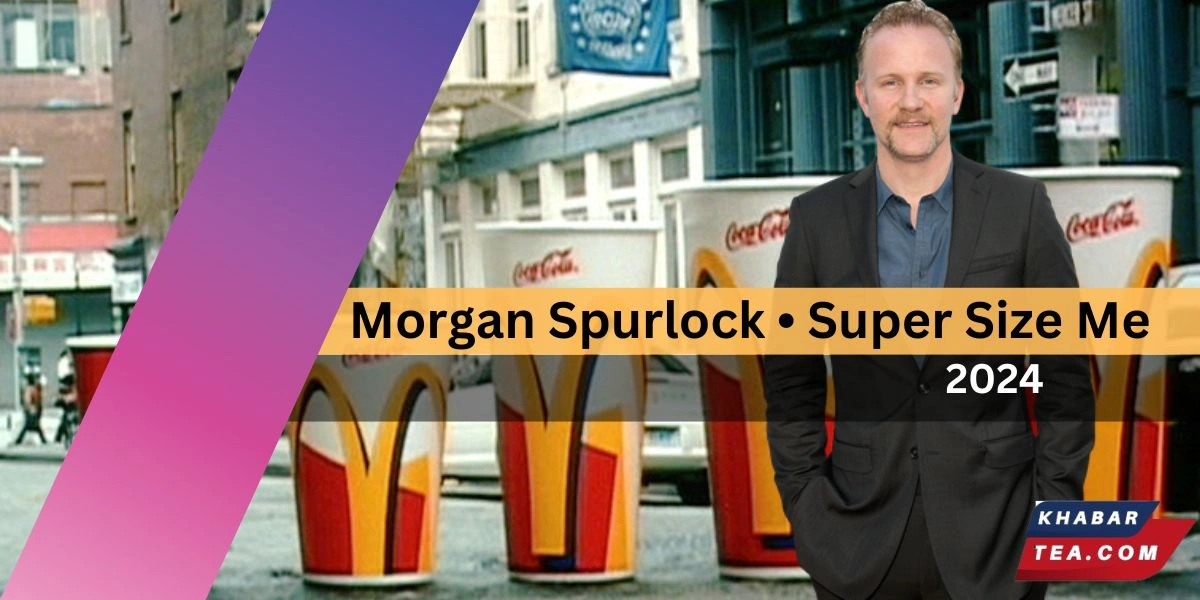
In the early 2000s, filmmaker Morgan Spurlock decided to take on a bold and eye-opening experiment that would forever change how we think about fast food. He created a documentary called “Super Size Me,” which quickly became a cultural phenomenon.
This film sparked widespread conversations about health, corporate responsibility, and personal choices. Let’s dive into the details.
Morgan Spurlock set out to explore the impact of eating only McDonald’s food for 30 days. He wanted to see what would happen to his health if he followed this diet, which included super-sizing his meals whenever asked.
This experiment wasn’t just about eating fast food; it was about shining a light on how these food choices affect our bodies and overall well-being.
- Consume three McDonald’s meals a day.
- Try every item on the McDonald’s menu at least once.
- “Super size” the meal when offered.
Read more: Saif Ali Khan Tattoo: Breaking NEWS- From Kareena to the Trident Symbol 2024
Table of Contents
The Physical Toll
Este 23 de mayo de 2024, murió a los 53 años de edad, víctima de cáncer, el director y protagonista de "Super Size Me", Morgan Spurlock.#RIP #QEPD pic.twitter.com/WPT13ikEUd
— SegunElCalendario (@SegunCalendario) May 25, 2024
In just a matter of days, Spurlock’s health took a sharp nosedive. His liver started struggling even more, and he seemed to pack on weight almost overnight.
Suddenly, he found himself dragging through the day, barely able to muster any energy.
And as if that wasn’t enough, his moods were all over the place, swinging from one extreme to another. It was like those sugary, fatty foods had cast a spell on him, trapping him in a cycle that was dragging him down fast.
Unmasking the Fast Food Industry
“Super Size Me” shed light on some significant concerns:
Marketing Strategies: The documentary brought attention to the intense marketing efforts directed at children by fast-food giants, sparking discussions about the ethics of targeting such a vulnerable demographic.

Health Concerns: Through Morgan Spurlock’s personal journey of rapid weight gain, elevated cholesterol levels, and liver damage, the film emphasizes the serious health risks associated with overindulging in fast food. This raised awareness about the need for healthier eating habits and the importance of moderation.
Portion Control: By questioning the prevailing “super size” culture within the fast-food industry, the documentary prompted reflection on portion sizes and their impact on overall health. It encouraged viewers to reconsider their consumption habits and the choices offered by these establishments.
Overall, “Super Size Me” served as a wake-up call, urging both consumers and the industry to reevaluate their attitudes and practices toward fast food.
The Fallout and Lessons Learned
After the documentary aired:
Morgan Spurlock, ‘Super Size Me’ Filmmaker, Dies at 53 – https://t.co/tPYjVLQWEj
— Trace1984 America First Ohio Patriot 🇺🇸 (@1984_Trace) May 25, 2024
McDonald’s decided to pull the plug on its “super size” option, responding to growing concerns about the health effects of oversized portions.
Parents and schools started paying closer attention to the impact of junk food on children’s health. It sparked conversations about nutrition and prompted many to rethink the snacks and meals provided to kids.
Advocacy groups seized the moment to push for clearer food labeling and more nutritious options in stores and restaurants. They saw an opportunity to create positive change and rallied for policies that prioritize public health over profit.
Takeaways for All of Us
It’s crucial to keep an eye on our eating habits. While it’s totally okay to treat ourselves to fast food every now and then, making it a regular thing can seriously mess with our health.
We’ve gotta educate ourselves about what we’re putting in our bodies and how it can affect us down the road. Plus, let’s push for more choices that are good for us and keep a close watch on how this stuff is marketed to us.
Conclusion
Morgan Spurlock’s documentary “Super Size Me” serves as a poignant reminder of the importance of being conscious about what we eat, holding corporations accountable for their actions, and recognizing the significant consequences of our everyday choices.
Through Spurlock’s experiment of consuming only McDonald’s food for 30 days, the film vividly illustrates the detrimental effects of a diet high in fast food. It sheds light on the alarming rates of obesity, heart disease, and other health issues plaguing society, all of which are exacerbated by the prevalence of unhealthy food options in our modern world.
Moreover, “Super Size Me” prompts viewers to consider the ethical implications of the fast food industry’s practices, particularly in terms of marketing to children and promoting oversized portions. It calls into question the responsibility of corporations to prioritize public health over profit margins and challenges consumers to demand better from the companies they support.
Ultimately, the documentary encourages individuals to adopt a more mindful approach to eating and to be aware of the broader impact of their dietary choices on both personal health and the larger community. It serves as a wake-up call to reevaluate our relationship with food and to strive for a healthier, more sustainable future.
FAQs
What is “Super Size Me”?
“Super Size Me” is a 2004 American documentary film directed by and starring Morgan Spurlock, an independent filmmaker. The film follows a 30-day period during which Spurlock claimed to consume only McDonald’s food. His goal was to investigate the effects of fast food on the human body and mind. The documentary received widespread attention for its shocking revelations about the fast food industry and its impact on personal health.
What did Morgan Spurlock do during the experiment?
Throughout the experiment, Morgan Spurlock ate an average of 5,000 calories a day from McDonald’s, always opting for a “super-size” meal if offered. He also exercised less than normal to match the average American’s physical activity at the time. By the end of the 30 days, he claimed to have gained 25 pounds (11.3 kg) and experienced depression and liver dysfunction.
What impact did “Super Size Me” have on McDonald’s?
The documentary had a significant impact on McDonald’s. After its release, the fast-food chain decided to discontinue its “super-size” option in 2004. Spurlock’s film prompted discussions about the rise of obesity in the United States and raised awareness about the consequences of excessive fast food consumption.
Were there any controversies surrounding the film?
Yes, there were controversies. Spurlock refused to share his meal logs, which led some to question the validity of his findings. Additionally, in 2017, he admitted to alcohol abuse, which other documentary makers believed explained his liver issues and poor mental health. Despite these controversies, “Super Size Me” remains a thought-provoking exploration of fast food culture.
Did Morgan Spurlock create any other documentaries related to fast food?
Yes, in 2019, Spurlock released a sequel titled “Super Size Me 2: Holy Chicken!” In this documentary, he opened his own restaurant and explored claims of healthy meals at big chain restaurants. The film delved into the complexities of the fast-food industry while examining the impact of food choices on health and well-being.
Morgan Spurlock’s work continues to resonate, sparking conversations about nutrition, consumer choices, and the influence of the fast food industry on our lives. His legacy as a creative filmmaker and social commentator remains significant, even after his passing in 2024.








